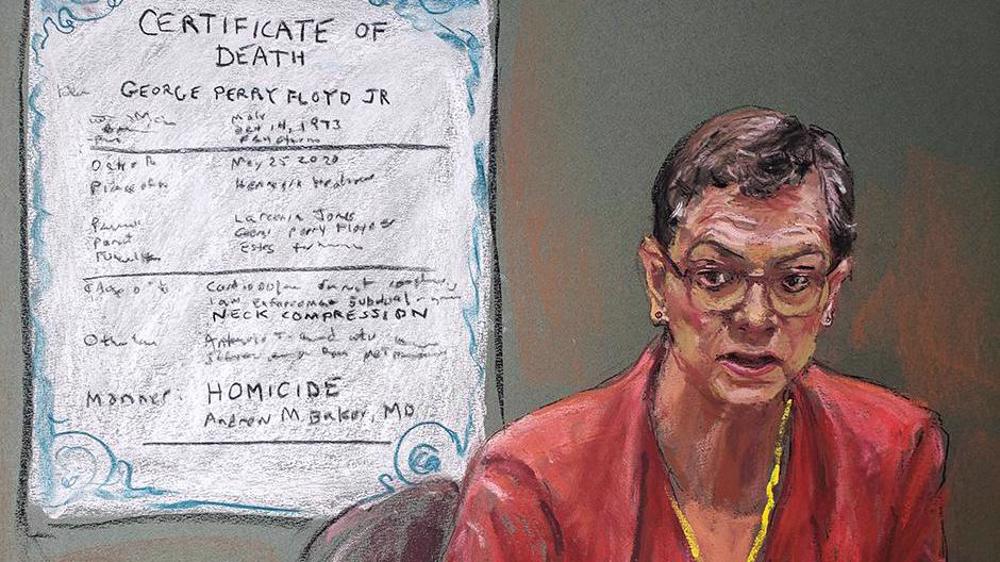Medical examiner who conducted autopsy on George Floyd blames police pressure for his death
The chief medical examiner who declared George Floyd's death a homicide after performing an autopsy on him has testified in court that the African American died from being restrained by police officers.
Dr. Andrew Baker, who has been the chief medical examiner in Hennepin County since 2004, said on Friday that Floyd had underlying heart disease and narrow coronary arteries that contributed to his death.
However, he testified that those medical conditions were not the primary cause of Floyd’s death as claimed by the prosecutors.
Baker said he was aware that Floyd had become unconscious while he was in police custody and had died at a hospital before he carried out the autopsy.
The medical examiner said he did not look at footage of Floyd's death until after the autopsy was performed, so as not to be biased in his findings.
Baker did not include a lack of oxygen, or asphyxia, as a cause of Floyd's death.
However, other prosecution medical experts were more explicit in their testimony.
“In this case, I believe the primary mechanism of death is asphyxia, or low oxygen,” said Dr. Lindsey Thomas, who retired from the Hennepin County Medical Examiner's Office in Minneapolis in 2017.
Thomas said she agreed with Dr. Baker that Floyd died from cardiopulmonary arrest — the ceasing of heart and lung function — complicated by the way police officers compressed his body and neck.
The testimony from Baker and Thomas as well as that of other experts reinforced the prosecution’s arguments that former officer Derek Chauvin killed Floyd by kneeling on his neck for 9 minutes.
Meanwhile, Chauvin’s defense team has argued that it was Floyd’s history of drug use and underlying conditions that caused his death.
Eric Nelson, Chauvin's attorney, has said Floyd could have died from a heart condition or the fentanyl and methamphetamine that were found in his system.
Under cross-examination, Baker agreed with Nelson's statement that Floyd's heart disease, narrowed arteries and drug use “played a role” in Floyd's death, but he testified that those things were not the primary cause of his death.
“Mr. Floyd's use of fentanyl did not cause the subdual or neck restraint,” Baker said. "His heart disease did not cause the subdual or the neck restraint."
Floyd, 46, died last May as Chauvin pressed a knee on his neck for almost nine minutes during his arrest while he was pinned down to the ground by officers.
The incident, which was captured on video that went viral, set off months of angry protests across the United States and the world, as people demanded an end to racial injustice and police brutality against African Americans.
His death in police custody also sparked an intense debate about systemic racism, police accountability and the criminal justice system in the United States.
Many similar cases have not led to charges for the officers involved, including in the deaths of Michael Brown, Eric Garner and Tamir Rice.
VIDEO | Press TV's news headlines
Gaza Nasser Hospital slams MSF’s ‘unsubstantiated’ claims as medical work suspended
Jordan condemns Israeli incursions at Al-Aqsa Mosque as 'flagrant violation'
Ex-Ukrainian energy minister arrested amid corruption probe while trying to flee
VIDEO | Israel using militias to deepen chaos in Gaza
Putin’s aide praises Iran’s ‘competitive’ technological achievements
VIDEO | Brussels exhibition exposes Western-backed genocide in Gaza
20,000 patients stuck as Gaza demands full operation of Rafah crossing










 This makes it easy to access the Press TV website
This makes it easy to access the Press TV website